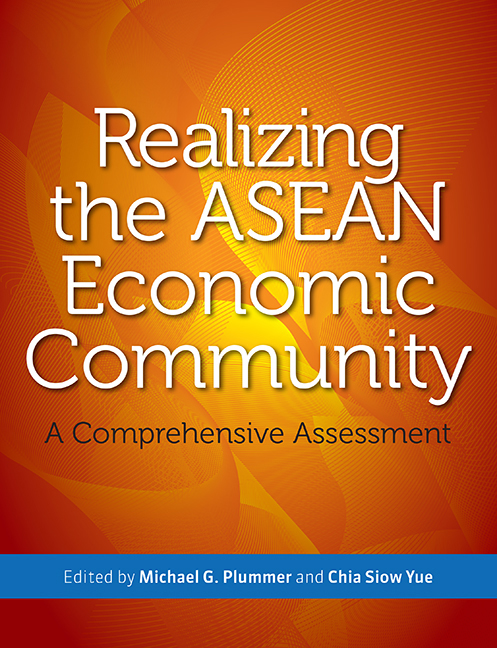Book contents
- Frontmatter
- Contents
- Illustrations
- Foreword
- Executive Summary
- Acknowledgements
- About the Contributors
- 1 Introduction
- 2 Regional Market for Goods, Services, and Skilled Labor
- 3 Competition Policy, Infrastructure, and Intellectual Property Rights
- 4 The AEC and Investment and Capital Flows
- 5 Narrowing the Development Gap in ASEAN
- 6 Competitiveness and Leverage
- 7 Benefits of the AEC
- References
- Appendix A AEC Components
- Appendix B The CGE Model
- Appendix C Developments in Logistics and Aviation
- Appendix D AEC Blueprint Excerpt
- Appendix E ASEAN Free Trade Agreements
- Appendix F ASEAN Member States' Free Trade Agreements
- Appendix G ASEAN Imports and Exports, 2000 and 2006
- Index
7 - Benefits of the AEC
Published online by Cambridge University Press: 21 October 2015
- Frontmatter
- Contents
- Illustrations
- Foreword
- Executive Summary
- Acknowledgements
- About the Contributors
- 1 Introduction
- 2 Regional Market for Goods, Services, and Skilled Labor
- 3 Competition Policy, Infrastructure, and Intellectual Property Rights
- 4 The AEC and Investment and Capital Flows
- 5 Narrowing the Development Gap in ASEAN
- 6 Competitiveness and Leverage
- 7 Benefits of the AEC
- References
- Appendix A AEC Components
- Appendix B The CGE Model
- Appendix C Developments in Logistics and Aviation
- Appendix D AEC Blueprint Excerpt
- Appendix E ASEAN Free Trade Agreements
- Appendix F ASEAN Member States' Free Trade Agreements
- Appendix G ASEAN Imports and Exports, 2000 and 2006
- Index
Summary
The potential economic and social gains from an AEC are considerable. Each section of the AEC Blueprint — from the single market and production base to integration in the global economy — should contribute significantly to the ultimate goal of ASEAN economic cooperation: regional prosperity, stability, and equity.
However admirable, this goal will not be easily achieved. Deep economic cooperation always faces political obstacles. For example, the European Economic Community achieved its single market nearly 40 years after it was established with the Treaty of Rome. NAFTA went through two incarnations under two US administrations and required a politically risky and bold intervention by President Clinton to be ratified (and during his presidential campaign Barak Obama even considered the need to renegotiate it). Lack of progress on the Doha Development Agenda can be traced to special interests and protectionist groups in constituent economies, and this for an agreement mild in comparison to the comprehensive measures being promulgated in the AEC. Likewise, the AEC will no doubt face opposition in the political bodies of member states. Making the political costs worth enduring will require making the likelihood of widely distributed and significant gains from the AEC compellingly clear.
To this end, our study has presented the economic implications of an AEC and used a variety of techniques and approaches, including a specially designed CGE model, to estimate gains and losses. The nature of the AEC and its many measures make exact estimates impossible but our use of the best proxies available make our estimates as realistic as possible.
We conclude that the AEC should lead to substantial gains, and that these gains should be widely distributed, though some countries and agents may benefit more than others. Our CGE estimates project a 5.3 percent increase in economic welfare relative to the baseline. This is a large impact, but we suggest that it constitutes a lower-bound estimate.
- Type
- Chapter
- Information
- Realizing the ASEAN Economic CommunityA Comprehensive Assessment, pp. 164 - 174Publisher: ISEAS–Yusof Ishak InstitutePrint publication year: 2009



